2018年苏教版小学英语知识点总结-优秀word范文 (3页)
苏教版四年级英语下知识点总结

苏教版四年级英语下知识点总结第一篇:苏教版四年级英语下知识点总结Unit oneour school subjects我们的学校课程一.词汇预览School /sku:l/学校go to school去上学student学生See /si:/看见,看到seed种子同音词sea海洋I see a bird我看见一只鸟Timetable time(时间)+table(表格)=timetable(时间表;课程表)Chinese [ˌtʃaɪˈni:z]语文;中国人;中国的I like chinese我喜欢语文Maths [mæθs/数学I have Maths today.我今天有数学课 Art 美术draw pictures 画画 PE=physical education 体育 Music 音乐song歌曲 Science 科学Subject 课程;主题Fun 有趣的;乐趣sun太阳This game is fun这个游戏很有趣Go to 去....go to Beijing去北京Playground 操场on the playground在操场上Lesson课;教训I have four lessons today我今天有四节课.Monday [ˈmʌndeɪ]周一,星期一缩写MONon Monday在星期一二.句型语法1.表示欢迎回到某地的句型 Welcome back to.....Welcome back to school, class欢迎回到学校,同学们 welcome back to+地点表示欢迎回到......Welcome back to China欢迎回到中国不接back 直接welcome to+地点表示欢迎来到....Welcome to my house欢迎到我家来welcome to my farm欢迎来到农场2.询问对方喜欢什么课程的句型及其回答A: What subjects do you like?What subjects什么课程B: I/we like+课程名What subjects do you like, Mike? 迈克,你喜欢什么课程?I like Chinese and Maths.我喜欢语文和数学.3.询问某个时间我们有什么课程的句型及回答 What lessons do we have+时间......? We have+课程名What lessons do we have today? We have Chinese,Maths,PE and Art.Unit TwoAfter school放学后一.词汇预览Go 去第三人称单数goes 对应词come来Go to school去上学go to bed去睡觉go shopping去购物Let’s go to school together.让我们一起去上学吧Match比赛;火柴a football match一场足球比赛 Get up 起床bed床I get up at six.我六点起床 Every每个 I run every day.我每天跑步After school放学后play table tennis 打乒乓球a football match一场足球比赛a swimming lesson一节游泳课 Every day每天Today 今天tomorrow明天巧记:to(向)+day(白天)=today今天Monday=Mon星期一Tuesday=Tue星期二Wednesday =Wed星期三Thursday=Thur星期四Friday=Fri星期五Saturday=Sat星期六 Sunday=Sun星期天在星期几用介词onon Saturday在星期六根据《圣经创世纪》,上帝是星期一到星期六创造了世界,星期日休息,所以犹太教和基督教星期日要做礼拜,这一天他们叫做“礼拜日”,而一周七天称“一个礼拜”。
英语六下知识点总结苏教版
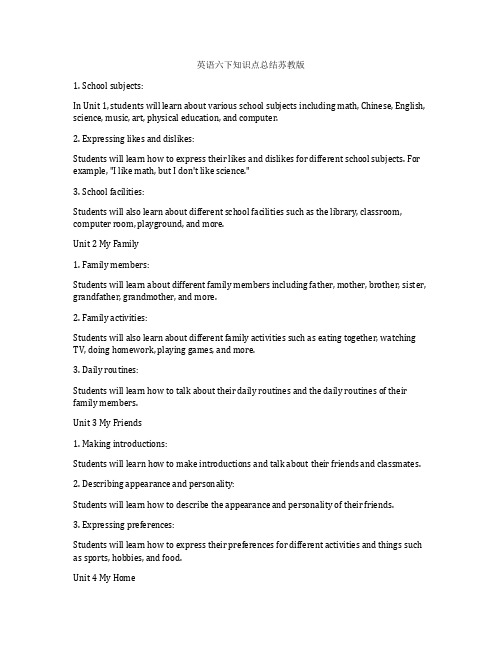
英语六下知识点总结苏教版1. School subjects:In Unit 1, students will learn about various school subjects including math, Chinese, English, science, music, art, physical education, and computer.2. Expressing likes and dislikes:Students will learn how to express their likes and dislikes for different school subjects. For example, "I like math, but I don't like science."3. School facilities:Students will also learn about different school facilities such as the library, classroom, computer room, playground, and more.Unit 2 My Family1. Family members:Students will learn about different family members including father, mother, brother, sister, grandfather, grandmother, and more.2. Family activities:Students will also learn about different family activities such as eating together, watching TV, doing homework, playing games, and more.3. Daily routines:Students will learn how to talk about their daily routines and the daily routines of their family members.Unit 3 My Friends1. Making introductions:Students will learn how to make introductions and talk about their friends and classmates.2. Describing appearance and personality:Students will learn how to describe the appearance and personality of their friends.3. Expressing preferences:Students will learn how to express their preferences for different activities and things such as sports, hobbies, and food.Unit 4 My Home1. Rooms in a house:Students will learn about different rooms in a house such as the living room, bedroom, kitchen, bathroom, and more.2. Furniture and household items:Students will also learn about different furniture and household items found in a typical home.3. Talking about location:Students will learn how to talk about the location of different rooms and items in their home.Unit 5 My Day1. Telling the time:Students will learn how to tell the time in English using both digital and analog clocks.2. Daily activities:Students will learn how to talk about their daily activities such as waking up, brushing teeth, eating breakfast, going to school, and more.3. Order of activities:Students will also learn about the order of activities in a typical day such as first, then, next, and finally.Unit 6 My Week1. Days of the week:Students will learn about the days of the week and how to talk about the activities they do on different days.2. Weekly activities:Students will also learn about different weekly activities such as going to school, having sports class, doing homework, and more.3. Expressing frequency:Students will learn how to express the frequency of different activities such as always, sometimes, often, and never.Unit 7 My Hobbies1. Talking about hobbies:Students will learn how to talk about their hobbies and the hobbies of their friends and classmates.2. Expressing preferences:Students will also learn how to express their preferences for different hobbies and activities such as reading, drawing, playing sports, and more.3. Free time activities:Students will learn how to talk about different activities they do in their free time such as watching TV, playing games, and going out with friends.Unit 8 My Clothes1. Clothing items:Students will learn about different clothing items such as t-shirt, pants, dress, shoes, hat, and more.2. Colors and patterns:Students will also learn about different colors and patterns that can be found on clothing items.3. Expressing preferences:Students will learn how to express their preferences for different clothing items and styles. Unit 9 My Body1. Body parts:Students will learn about different body parts including head, shoulders, knees, toes, eyes, ears, mouth, and more.2. Describing physical features:Students will also learn how to describe their physical features and the physical features of others.3. Expressing feelings:Students will learn how to express their feelings and talk about how they are feeling physically.Unit 10 My Animals1. Types of animals:Students will learn about different types of animals such as pets, farm animals, wild animals, and more.2. Animal habits and habitats:Students will also learn about the habits and habitats of different animals.3. Expressing preferences:Students will learn how to express their preferences for different animals and talk about their favorite animals.。
(完整word版)苏教版四年级英语下册英语知识点复习,推荐文档
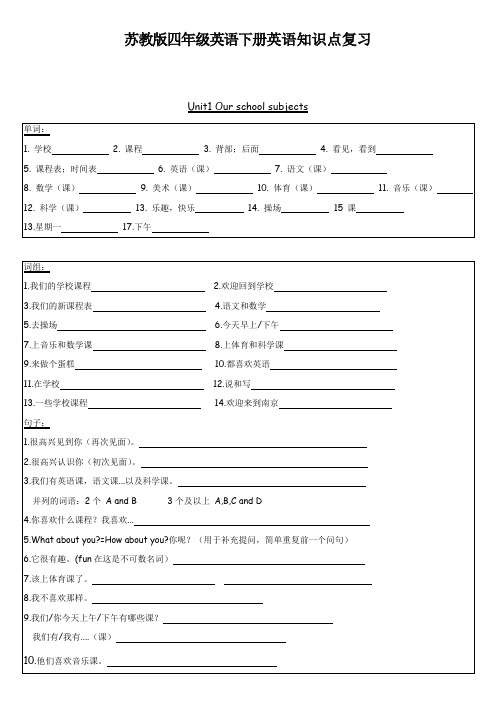
2.我们喜欢春天/夏天/秋天/冬天。
3.这是你的夹克衫。(穿上你的夹克衫)
4.嘿,这是你的包吗?
5.这是谁的包?
6.是我的包。她拿了我的包。
Unit6 Whose dress is this?
单词:
1.连衣裙2.太,过于3.裤子4.聚会,派对
5.手套6.如此,这么7.外衣,外套(男式)衬衫
我们有/我有....(课)
10.他们喜欢音乐课。
Unit2 After school
单词:
1.在……后面2.去3.天4.星期三(WED)5.比赛
6.今天7.遗憾8.星期六(SAT)9.星期日(SUN)
10.星期二(TUE)11.星期四(THUR)12.星期五(FRI)13.什么时候
14.每个16.一星期;周17.星期一(MON)
词组:
1.来学校2.今天不能来学校
3.感冒又发烧4.保重
5.明天见6.头疼
9.不太好10.咳嗽
11.在学校,在上学12.在盒子里的热狗
*13.去看吴医生14.放学后再见
15.咳嗽又头疼16.谈论一些疾病
*17.打个电话18.狐狸的午餐
句子:
1.你好吗?你现在怎样了?
回答:我很好,谢谢。不太好,我生病了。我得了重感冒。
1.你什么时候起床/上学/吃午饭...?
在...(几点)
2.你看看那边是什么?
3.多么大的一块蛋糕啊!
4.我喜欢蛋糕。
U3中主要的词组句子都在书上P18-19,多记多写。
Unit4 Drawing in the park
单词:
1.g画画2.公园3.画4.主意,想法
5.花,花朵6.树7.他们,她们,它们8.容易的,简单的
苏教版小学英语语法复习要点[精品文档]
![苏教版小学英语语法复习要点[精品文档]](https://img.taocdn.com/s3/m/a6a004c0941ea76e58fa0494.png)
苏教版小学英语语法复习要点一、名词复数规则1.一般情况下,直接加-s,如:book-books, bag-bags, cat-cats, bed-beds2.以s. x. sh. ch结尾,加-es,如:bus-buses, box-boxes, brush-brushes, watch-watches3.以“辅音字母+y”结尾,变y为i, 再加-es,如:family-families, strawberry-strawberries4.以“f或fe”结尾,变f或fe为v, 再加-es,如:knife-knives5.不规则名词复数:man-men, woman-women, policeman-policemen, policewoman-policewomen, mouse-mice child-children foot-feet,.tooth-teeth fish-fish, people-people, Chinese-Chinese, Japanese-Japanese写出下列各词的复数I _________him _________this ___________her ______ watch _______child _______photo ________diary ______ day________ foot________ book_______ dress ________ tooth_______ sheep ______box_______ strawberry _____ thief _______yo-yo ______ peach______ sandwich ______ man______ woman_______ paper_______ juice___________ water________ milk________ rice__________ tea__________二、一般现在时一般现在时基本用法介绍【No. 1】一般现在时的功能1.表示事物或人物的特征、状态。
(完整word版)苏教版四年级英语语法总结-推荐文档

(一)情态动词canca.在英语中有一个特殊的名字,叫做情态动词,表示“能够”.“会”.“能力”后面要跟着表示动作的动词。
没有时态和人称的变化。
表示不能做什么的时候,后面加.not为ca.not,或者缩写为can’t。
问别人“能…吗?”要把ca.放在句子前面,首字母要大写,句尾别忘加上问号。
例句:—.ca.swing..ca.draw. —Sh.ca.jump.H.ca.pla..—W.ca.touc..The.ca.run. —.can’.sing.Yo.can’.see.—Sh.can’.dance.H.can’.hea..car.—W.can’.hea.a.aeroplane.—Ca.yo.hea..dog?Ca.h.hea..bus?—Ca.Luc.write?Ca.yo.d.it?将下面各组词组成句子1._____________(an,aeroplane,hear,Lucy,can)2._____________________(not,h.,dance,ca.)3.__________________.(you,ca.,see,wha.)4._________________(ca.,se.,no.,w.,you)5._________________.(.,ca.,hel.,yo.)6._____________________.(I,ca.,do,what)7.___________________.(yo.,ca.,hea. me)8.___________________.(yo.,ca.,dance)(二)人称代词所属格注意:主格作主语,其中she指带代国家,it可指代天气时间等。
宾格作宾语,介词宾语,表语。
动词后面用人称宾格形容词性物主代词作定语。
名词性物主代词作主语,宾语,介词宾语,表语书信yours…表.---.的,这样的词我们也学习很多了,你能想出来吗?记住这个小口诀就很容易了:我.m.,你的your,他.his、她的her.//它的是its.我们.our.你们的.your他们(它们,她们)的是their//这些人称代词形式称为人称代词所属格,也叫形容词性物主代词。
苏教版四年级英语下知识点总结
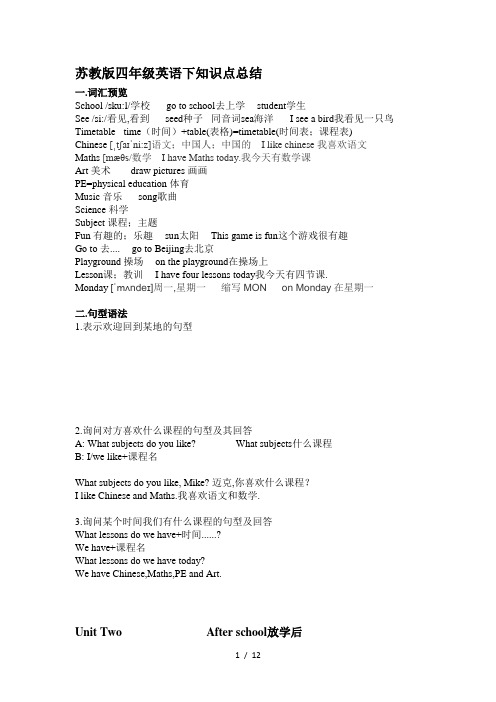
苏教版四年级英语下知识点总结一.词汇预览School /sku:l/学校go to school去上学student学生See /si:/看见,看到seed种子同音词sea海洋I see a bird我看见一只鸟Timetable time(时间)+table(表格)=timetable(时间表;课程表) Chinese [ˌtʃaɪˈni:z]语文;中国人;中国的I like chinese我喜欢语文Maths [mæθs/数学I have Maths today.我今天有数学课Art 美术draw pictures 画画PE=physical education 体育Music 音乐song歌曲Science 科学Subject 课程;主题Fun 有趣的;乐趣sun太阳This game is fun这个游戏很有趣Go to 去.... go to Beijing去北京Playground 操场on the playground在操场上Lesson课;教训I have four lessons today我今天有四节课.Monday [ˈmʌndeɪ]周一,星期一缩写MON on Monday在星期一二.句型语法1.表示欢迎回到某地的句型2.询问对方喜欢什么课程的句型及其回答A: What subjects do you like? What subjects什么课程B: I/we like+课程名What subjects do you like, Mike? 迈克,你喜欢什么课程?I like Chinese and Maths.我喜欢语文和数学.3.询问某个时间我们有什么课程的句型及回答What lessons do we have+时间......?We have+课程名What lessons do we have today?We have Chinese,Maths,PE and Art.Unit Two After school放学后一.词汇预览Go to school去上学go to bed去睡觉go shopping去购物Let’s go to school together.让我们一起去上学吧Match比赛;火柴 a football match一场足球比赛Get up 起床bed床I get up at six.我六点起床Every每个 I run every day.我每天跑步After school放学后play table tennis 打乒乓球a football match一场足球比赛 a swimming lesson一节游泳课Every day每天Today 今天tomorrow明天巧记:to(向)+day(白天)=today今天Monday=Mon星期一Tuesday=Tue星期二Wednesday =Wed星期三Thursday=Thur星期四Friday=Fri星期五Saturday=Sat星期六Sunday=Sun星期天在星期几用介词on on Saturday在星期六根据《圣经创世纪》,上帝是星期一到星期六创造了世界,星期日休息,所以犹太教和基督教星期日要做礼拜,这一天他们叫做“礼拜日”,而一周七天称“一个礼拜”。
苏教版英语知识点总结小学
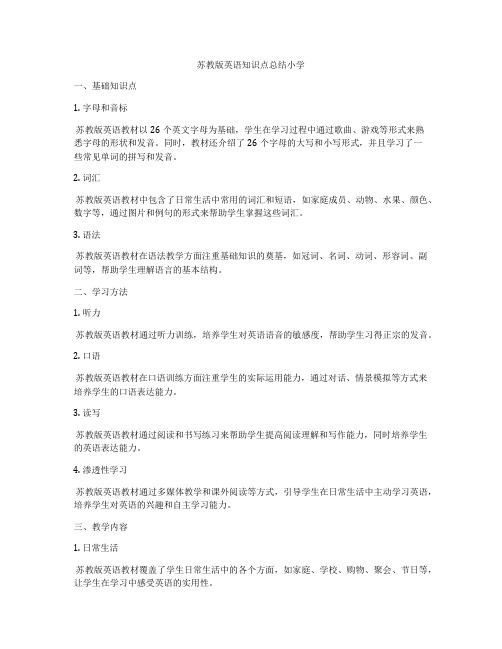
苏教版英语知识点总结小学一、基础知识点1. 字母和音标苏教版英语教材以26个英文字母为基础,学生在学习过程中通过歌曲、游戏等形式来熟悉字母的形状和发音。
同时,教材还介绍了26个字母的大写和小写形式,并且学习了一些常见单词的拼写和发音。
2. 词汇苏教版英语教材中包含了日常生活中常用的词汇和短语,如家庭成员、动物、水果、颜色、数字等,通过图片和例句的形式来帮助学生掌握这些词汇。
3. 语法苏教版英语教材在语法教学方面注重基础知识的奠基,如冠词、名词、动词、形容词、副词等,帮助学生理解语言的基本结构。
二、学习方法1. 听力苏教版英语教材通过听力训练,培养学生对英语语音的敏感度,帮助学生习得正宗的发音。
2. 口语苏教版英语教材在口语训练方面注重学生的实际运用能力,通过对话、情景模拟等方式来培养学生的口语表达能力。
3. 读写苏教版英语教材通过阅读和书写练习来帮助学生提高阅读理解和写作能力,同时培养学生的英语表达能力。
4. 渗透性学习苏教版英语教材通过多媒体教学和课外阅读等方式,引导学生在日常生活中主动学习英语,培养学生对英语的兴趣和自主学习能力。
三、教学内容1. 日常生活苏教版英语教材覆盖了学生日常生活中的各个方面,如家庭、学校、购物、聚会、节日等,让学生在学习中感受英语的实用性。
2. 文化苏教版英语教材还介绍了英语国家的文化和风土人情,帮助学生了解不同国家的生活方式和文化传统。
3. 情感教育苏教版英语教材在情感教育方面注重培养学生的合作精神和团队意识,通过合作学习和游戏活动来促进学生之间的互动和交流。
四、教学手段1. 多媒体教学苏教版英语教材通过多媒体教学手段,如音频、视频等,来激发学生的学习兴趣,提高教学效果。
2. 课外阅读苏教版英语教材鼓励学生进行课外阅读,通过故事、小说等形式来拓展学生的阅读广度和深度,培养学生的独立思考和分析能力。
3. 游戏活动苏教版英语教材在教学中引入了各种游戏活动,如角色扮演、抢答游戏等,来丰富教学内容,激发学生学习的兴趣和动力。
(完整word版)苏教版英语五上U3知识要点
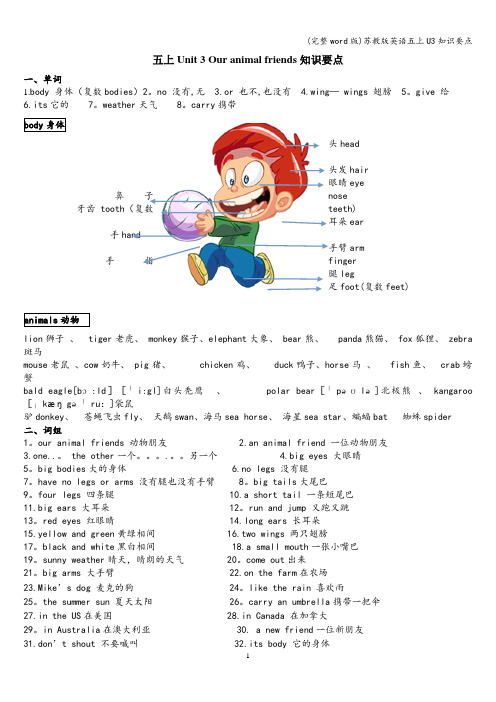
五上Unit 3 Our animal friends知识要点一、单词1.body 身体(复数bodies)2。
no 没有,无 3.or 也不,也没有 4.wing— wings 翅膀 5。
give 给6.its它的 7。
weather天气 8。
carry携带body身体头head头发hair眼睛eye 鼻子nose牙齿tooth(复数teeth)耳朵ear手hand手臂arm手指finger腿leg足foot(复数feet)animals动物lion狮子、 tiger老虎、 monkey猴子、elephant大象、 bear熊、 panda熊猫、 fox狐狸、 zebra斑马mouse老鼠、cow奶牛、 pig猪、 chicken鸡、 duck鸭子、horse马、 fish鱼、 crab螃蟹bald eagle[bɔ:ld][ˈi:gl]白头秃鹰、 polar bear[ˈpəʊlə]北极熊、 kangaroo[ˌkæŋgəˈru:]袋鼠驴donkey、苍蝇飞虫fly、天鹅swan、海马sea horse、海星sea star、蝙蝠bat 蜘蛛spider二、词组1。
our animal friends 动物朋友 2.an animal friend 一位动物朋友3.one..。
the other一个。
.。
另一个4.big eyes 大眼睛5。
big bodies大的身体 6.no legs 没有腿7。
have no legs or arms 没有腿也没有手臂 8。
big tails大尾巴9。
four legs 四条腿 10.a short tail 一条短尾巴11.big ears 大耳朵 12。
run and jump 又跑又跳13。
red eyes 红眼睛 14.long ears 长耳朵15.yellow and green黄绿相间 16.two wings 两只翅膀17。
- 1、下载文档前请自行甄别文档内容的完整性,平台不提供额外的编辑、内容补充、找答案等附加服务。
- 2、"仅部分预览"的文档,不可在线预览部分如存在完整性等问题,可反馈申请退款(可完整预览的文档不适用该条件!)。
- 3、如文档侵犯您的权益,请联系客服反馈,我们会尽快为您处理(人工客服工作时间:9:00-18:30)。
本文部分内容来自网络整理,本司不为其真实性负责,如有异议或侵权请及时联系,本司将立即删除!
== 本文为word格式,下载后可方便编辑和修改! ==
苏教版小学英语知识点总结
英语作为世界通用语言在我们的学习生活中也变得越来越重要,小学的时候我们就开始学习英语,你知道要学习哪些知识吗?下面是小编为大家整理的小学英语知识归纳,希望对大家有用!
小学英语知识
一、like一词的用法like用作及物动词,译为“喜欢”
(1)后接名词或代词,表示喜欢某人或某物。
如:I like the baby very much. 我非常喜欢这个小孩。
(2)后接动名词(v. -ing),表示“喜欢做某事”,着重于习惯、爱好。
如:Tom likes playing football. 汤姆喜欢踢足球。
(3)后接动词不定式(to do ),表示“偶尔地喜欢做某事”,着重于某次具体的行为。
如:I like reading, but I like to watch TV this evening. 我喜欢读书,但我今晚想看电视。
二、句子单数变复数,注意以下五要素
(1)主格人称代词要变成相应的复数主格人称代词,即I→we, you→you,
she,he,it→ they。
如:She is a girl. →They are girls.
(2)am,is要变为are。
如:I’m a student. →We are students.
(3)不定冠词a,an要去掉。
如:He is a boy. →They are b oys.
(4)普通单数名词要变为复数形式。
如:It is an apple. →They are apples.
(5)指示代词this,that要变为these,those。
如:This is a box.
→These
are boxes.
小学必备英语知识点
1、形容词性物主代词8个:
My (我的),your(你的) ,his(他的) ,her (她的),its (它的),our (我们的),your (你们的),their(他(她、它)们的)
2、形容词性物主代词的特点:
1)译成汉语都有"的" eg:my 我的, their 他们的
2)后面加名词:eg:my backpack ,his name
3)前后不用冠词 a, an ,the
This is a my eraser.(错误)
That is your a pen.(错误)
It's his the pen.(错误)
3、I(物主代词)my, you(物主代词)your ,he (物主代词)her, we (物主代词) our
小学基础英语知识点
一、名词性物主代词
1、名词性物主代词和形容词性物主代词一样有8个:
Mine yours his hers its ours yours theirs
我的你的他的她的它的我们的你们的他(她、它)们的
2、名词性物主代词的特点:
1)译成汉语都有"的"
2)后面不加名词
3)名词性物主代词=形容词性物主代词+名词
Eg:1、the pen is mine 钢笔是我的(mine=my pen)
二、单数的句子变成复数的句子
把单数的句子成复数的句子很简单:变法是把能变成复数的词变成复数,但a或an要把去掉。
特殊疑问词、形容词、国家及地点通常不变。
Eg:把下列句子变成复数
1, I have a car ----we have cars
2, He is an American boy. ----They are American boys
3, It is a car ----They are cars
4,This is an eraser ----These are erasers
5,That is a backpsck -----Those are backpacks
6,I'm an English teather ------We are English teathers
7,It's a new shirt---- They are new shirts
8,He's a boy ----They are boys
9,She's a singer ------They are singers
10,What'sthis in English?---- What are these in English?
猜你喜欢:
1. 初一英语上册知识点归纳整理
2. 人教版初一上册英语知识点归纳总结
3. 人教版七年级英语上册知识点梳理
4. 人教版七年级下册英语知识点整理
5. 人教版高一英语必修一知识点总结
6. 小升初英语考试复习题。
